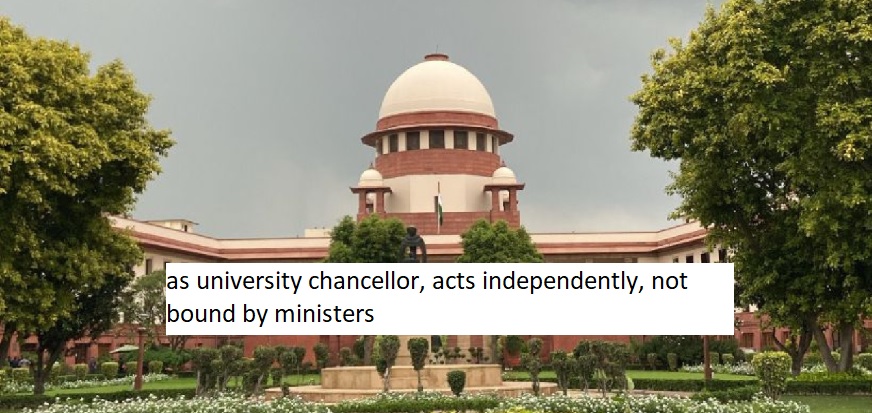


In a significant ruling on November 30, 2023, the Supreme Court set aside the re-appointment of Dr. Gopinath Ravindran as the Vice Chancellor (VC) of Kannur University in Kerala. The Court emphasized that when the Governor of a State acts as the Chancellor of a State University, it is done in a personal capacity and not under the advice of the council of ministers. The bench, consisting of Chief Justice DY Chandrachud, Justice JB Pardiwala, and Justice Manoj Misra, quashed the re-appointment notification of November 23, 2021, citing "unwarranted intervention of the State Government" and noting that the Chancellor had "abdicated or surrendered" statutory powers.
The judgment highlighted the autonomy of Kannur University, protected by the Kannur University Act 1996 and UGC statutes, to prevent interference from the State Government. It stressed that the Chancellor, holding a pivotal role, acts independently and is not bound by the State Government's advice in discretionary powers' exercise.
The verdict elucidated the distinct authorities of the Chancellor and the State Government, affirming that the Chancellor acts in a personal capacity, not as a representative of the Governor's office. The Chancellor's powers in appointing and reappointing the Vice-Chancellor were deemed exercised solely in the university's interest, with the Chancellor as the sole judge in these matters.
The court clarified that, despite being the Chancellor by virtue of the Governor's office, the Governor did not perform duties or exercise powers individually. It pointed out the clear distinction in the statute between the Chancellor and the State Government, emphasizing the personal capacity in which the Chancellor acts.
The judgment further stated that, according to the Act of 1996 and the associated statutes, the Chancellor's role was more than titular. In the selection of the Vice-Chancellor, the Chancellor is the sole judge, and his opinion is final. The reappointment criteria also stressed the Chancellor's consideration of the university's interest.
The Court explicitly denounced any external interference in the Chancellor's statutory discretion, considering it impermissible and inconsistent with legal principles. It emphasized that the Chancellor must discharge statutory duties guided by personal judgment, not at the behest of others. The judgment condemned any extraneous influence as dictation from political superiors, a practice contrary to established legal principles.
In conclusion, the Supreme Court's ruling underscored the Chancellor's autonomy in State University matters, emphasizing the personal capacity in which the Governor acts as Chancellor. The decision highlighted the distinct roles of the Chancellor and the State Government, ensuring that the Chancellor's statutory discretion remains free from external interference. This landmark judgment reaffirms the principles of independence and autonomy crucial for the effective functioning of State Universities.
In a significant ruling on November 30, 2023, the Supreme Court set aside the re-appointment of Dr. Gopinath Ravindran as the Vice Chancellor (VC) of Kannur University in Kerala. The Court emphasized that when the Governor of a State acts as the Chancellor of a State University, it is done in a personal capacity and not under the advice of the council of ministers. The bench, consisting of Chief Justice DY Chandrachud, Justice JB Pardiwala, and Justice Manoj Misra, quashed the re-appointment notification of November 23, 2021, citing "unwarranted intervention of the State Government" and noting that the Chancellor had "abdicated or surrendered" statutory powers.
The judgment highlighted the autonomy of Kannur University, protected by the Kannur University Act 1996 and UGC statutes, to prevent interference from the State Government. It stressed that the Chancellor, holding a pivotal role, acts independently and is not bound by the State Government's advice in discretionary powers' exercise.
The verdict elucidated the distinct authorities of the Chancellor and the State Government, affirming that the Chancellor acts in a personal capacity, not as a representative of the Governor's office. The Chancellor's powers in appointing and reappointing the Vice-Chancellor were deemed exercised solely in the university's interest, with the Chancellor as the sole judge in these matters.
The court clarified that, despite being the Chancellor by virtue of the Governor's office, the Governor did not perform duties or exercise powers individually. It pointed out the clear distinction in the statute between the Chancellor and the State Government, emphasizing the personal capacity in which the Chancellor acts.
The judgment further stated that, according to the Act of 1996 and the associated statutes, the Chancellor's role was more than titular. In the selection of the Vice-Chancellor, the Chancellor is the sole judge, and his opinion is final. The reappointment criteria also stressed the Chancellor's consideration of the university's interest.
The Court explicitly denounced any external interference in the Chancellor's statutory discretion, considering it impermissible and inconsistent with legal principles. It emphasized that the Chancellor must discharge statutory duties guided by personal judgment, not at the behest of others. The judgment condemned any extraneous influence as dictation from political superiors, a practice contrary to established legal principles.
In conclusion, the Supreme Court's ruling underscored the Chancellor's autonomy in State University matters, emphasizing the personal capacity in which the Governor acts as Chancellor. The decision highlighted the distinct roles of the Chancellor and the State Government, ensuring that the Chancellor's statutory discretion remains free from external interference. This landmark judgment reaffirms the principles of independence and autonomy crucial for the effective functioning of State Universities.
TAGS: Supreme Court Kannur University Governor Chancellor Vice Chancellor Re-appointment Autonomy